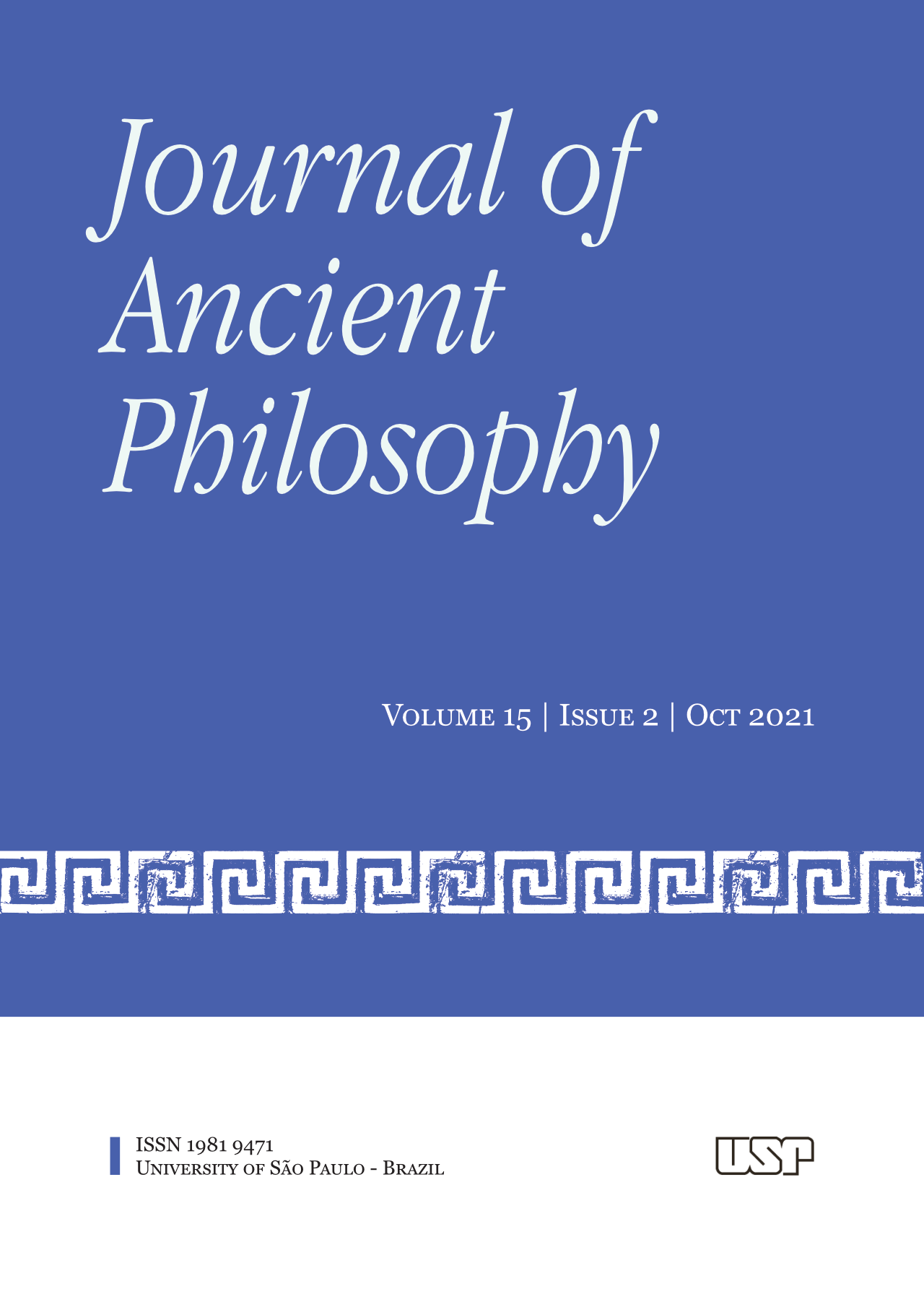“Nous alone enters from outside” - Aristotelian embryology and early Christian philosophy
DOI:
https://doi.org/10.11606/issn.1981-9471.v15i2p109-138Keywords:
embryology, nous, Aristotle, Christian theologyAbstract
In a work entitled On the Generation of Animals, Aristotle remarks that “intellect (nous) alone enters from outside (thurathen)”. Interpretations of this passage as dualistic dominate the history of ideas and allow for a joining together of Platonic and Aristotelian doctrine on the soul. This, however, pulls against the well-known Aristotelian position that soul and body are intertwined and interdependent. The most influential interpretations thereby misrepresent Aristotle’s view on soul and lack any real engagement with his embryology. This paper seeks to extract the account of intellect (nous) in Aristotelian embryology from this interpretative background and place it within the context of his mature biological thought. A clear account of the actual import of this statement in its relevant context is given before explaining how it has been misunderstood by various interpretative traditions. The paper finishes by touching on how early commentary by Christian writers, freed as it was from the imperative to synthesise Greek philosophy, differed from those that came after. While realising that Aristotle’s position would not aid them in their explanations of the soul’s survival after death, their engagement with Aristotle’s science allowed for other aspects of theology concerning the fittingness of soul to body.
Downloads
References
Allen, P. (1985) The Concept of Woman: The Aristotelian Revolution, 750 BC-AD 1250, Montreal: Eden Press.
Bartos, H. (2016) Philosophy and Dietetics in the Hippocratic On Regimen: A Delicate Balance of Health, Leiden: Brill.
Berti, E. (1993) "Quando Esiste l'Uomo in Potenza? La Tesi di Aristotele", in Nascita e Morte dell'Uomo: Problemi Filosofici e Scientifici, ed. S. Biolo, Genoa: Marietti: 115-23.
Bos, A. P. (2003) The Soul and Its Instrumental Body: A Reinterpretation of Aristotle's Philosophy of Living Nature, Leiden: Brill.
Bos, A. P. (2007) “The ‘Vehicle of Soul’ and the Debate Over the Origin of this Concept” Philologus 151: 31-50.
Bos., A. P. (2002) “Pneuma and Ethics in Aristotle’s Philosophy of Living Nature”, The Modern Schoolman 79: 255-76.
Congourdeau, M.-H. (2002) “L’embryon Entre Néoplatonisme et Christianisme”, in Oriens-Occidens: Sciences, Mathématiques et Philosophie de l’Antiquité à l’Age Classique, Paris: Université Paris 7 - Denis Diderot: 201-16.
Congourdeau, M.-H. (2018) “Debating the Soul in Late Antiquity”, in Reproduction: Antiquity to The Present Day, eds. N. Hopwood, R. Flemming and L. Kassell, Cambridge: Cambridge University Press: 109-122.
Connell, S. M. (2000) “Aristotle and Galen on Sex Difference and Reproduction: A New Approach to an Ancient Rivalry”, Studies in the History and Philosophy of Science, 31/3: 405-427.
Edwards, M. (2019) Aristotle and Early Christian Thought, London: Routledge.
Falcon, A. (2021) “The Reception of Aristotle’s Biology in Late Antiquity and Beyond”, in The Cambridge Companion to Aristotle’s Biology, ed. S. M. Connell, Cambridge: Cambridge University Press.
Flemming, R. (2018) “Galen’s Generations of Seeds”, in Reproduction: Antiquity to The Present Day, eds. N. Hopwood, R. Flemming and L. Kassell, Cambridge: Cambridge University Press: 95-108.
Hatzimichali, M. (2021) “The Early Reception of Aristotle’s Biology”, in The Cambridge Companion to Aristotle’s Biology, ed. S. M. Connell, Cambridge: Cambridge University Press: 228-245.
Jones, D. A. (2004) The Soul of the Embryo. An Enquiry into the Status of the Human Embryo in the Christian Tradition, London: Continuum.
Lennox, J. G. (1995) “The Disappearance of Aristotle’s Biology: A Hellenistic Mystery”, in The Sciences in Greco-Roman Society, ed. T. D. Barnes, Edmonton: Academic Printing and Publishing: 7-24.
Lennox, J. G. (2021) Aristotle on Inquiry: Erotetic Frameworks and Domain Specific Norms, Cambridge: Cambridge University Press.
Menn, S. (1992) “Aristotle and Plato on God as Nous and as the Good”, Review of Metaphysics 45: 543-73.
Moraux, P. (1995) “A Propos de νοῦς θύραθεν chez Aristote”, in Autour D’Aristote, ed. A. Mansion, Louvain: Publications Universitaires de Louvain: 255-95.
Morrison, B. (2002) On Location: Aristotle’s Concept of Place, Oxford: Clarendon.
Musallam, B. (1990) “The Human Embryo in Arabic Scientific and Religious Thought”, in The Human Embryo: Aristotle and the Arabic and European Traditions, ed. G. R. Dunstan, Exeter: University of Exeter Press: 32–46.
Polansky, R. (2007) Aristotle’s De Anima, Cambridge: Cambridge University Press.
Singer, P. N. (2020) “Galen on Pneuma: Between Metaphysical Speculation and Anatomical Theory”, in Pneuma After Aristotle, eds. S. Coughlin, D. Leith and O. Lewis, Berlin: Edition Topoi: 237-82.
Wilberding, J. (2017) Forms, Souls, and Embryos: Neoplatonists on Human Reproduction, London: Routledge.
Winovsky, R. (2005) “Avicenna and the Avicennian Tradition”, in The Cambridge Companion to Arabic Philosophy, ed. P. Adamson, Cambridge: Cambridge University Press: 92-136.
Downloads
Published
Issue
Section
License

This work is licensed under a Creative Commons Attribution-NonCommercial 4.0 International License.
Copyright
Authors who publish with this journal agree to the following terms:
- Authors retain copyright and grant the journal right of first publication with the work simultaneously licensed under a Creative Commons Attribution License (CC By 4.0) that allows others to share the work with an acknowledgement of the work's authorship and initial publication in this journal.
- Authors are able to enter into separate, additional contractual arrangements for the non-exclusive distribution of the journal's published version of the work (e.g., post it to an institutional repository or publish it in a book), with an acknowledgement of its initial publication in this journal.
- Authors are permitted and encouraged to post their work online (e.g., in institutional repositories or on their website) prior to and during the submission process, as it can lead to productive exchanges, as well as earlier and greater citation of published work (See The Effect of Open Access).


